Annette Trossbach inducted as WGCU Maker
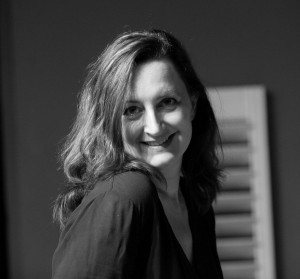 On March 23, WGCU will induct Annette Trossbach into an elite group of 50 Makers: Women Who Make Southwest Florida. The honor reflects more than the gargantuan role she has played over the past nine years in establishing the Laboratory Theater of Florida as a bastion for innovative, groundbreaking theater productions. It recognizes the influence she has exercised in transforming local theater into a safe and acceptable environment in which artists and audiences can explore,
On March 23, WGCU will induct Annette Trossbach into an elite group of 50 Makers: Women Who Make Southwest Florida. The honor reflects more than the gargantuan role she has played over the past nine years in establishing the Laboratory Theater of Florida as a bastion for innovative, groundbreaking theater productions. It recognizes the influence she has exercised in transforming local theater into a safe and acceptable environment in which artists and audiences can explore, 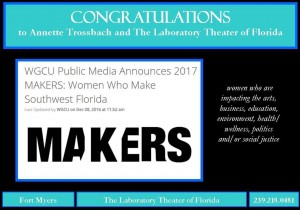 discuss and expand personal horizons and raise their collective social consciousness.
discuss and expand personal horizons and raise their collective social consciousness.
MAKERS are authentic, passionate and inspirational women who are leaving an impact on the arts, business, education, the environment, health and wellness, politics and/or social justice in Southwest Florida. WGCU began recognizing MAKERS in 2011 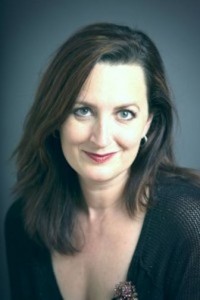 and selected 45 women for this distinction over the program’s first four years. The 2017 class of inductees will be the last. Selected from more than 50 nominees, the other four 2017 MAKERS are:
and selected 45 women for this distinction over the program’s first four years. The 2017 class of inductees will be the last. Selected from more than 50 nominees, the other four 2017 MAKERS are:
- Cape Coral resident Heather Mazurkiewicz, founder and president of The Florida Cancer Presumption Coalition,
- Fort Myers resident Kathryn Kelly, founder and CEO of The Heights Foundation,
- Sharon Miller, founder of Trailways Camp, and
- Sharon Murphy, founder and CEO of The McGregor Clinic.
According to MAKERS Selection Committee member and WGCU E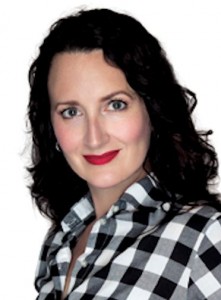 xecutive Producer and Public Media Representative Barbara Linstrom, Annette Trossbach exemplifies each of the criteria WGCU looks for in a MAKER – leaving a legacy, building community, defying social norms and serving as a first in her field. “She takes chances with the subject matter and fills a vital role in helping the arts reflect the social issues we face,” notes Linstrom.
xecutive Producer and Public Media Representative Barbara Linstrom, Annette Trossbach exemplifies each of the criteria WGCU looks for in a MAKER – leaving a legacy, building community, defying social norms and serving as a first in her field. “She takes chances with the subject matter and fills a vital role in helping the arts reflect the social issues we face,” notes Linstrom.
Legacy of Transformative and Immersive Theater
Born in Germany and educated in Great Britain (she has degrees in both acting and directing from the University of Essex in England, 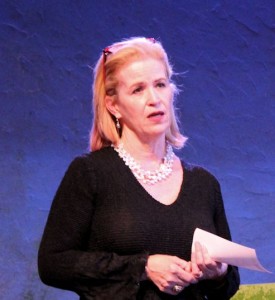 whose campuses are located in and outside of London), Trossbach strives to make people think deeper and feel more through theater.
whose campuses are located in and outside of London), Trossbach strives to make people think deeper and feel more through theater.
“She feels that theater should educate as well as enlighten and entertain,” remarks Anne Dodd (pictured right), who had the pleasure of directing Annette in The Lab’s recent production of Lanford Wilson’s Burn This. “She is tenacious and strong and believes in the power of theater.”
That belief is multi-tiered.
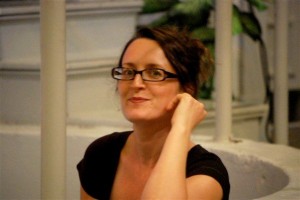 At the forefront is Trossbach’s conviction that one need not travel to 47th Street in Manhattan or London’s West End to find great theater. “Outstanding productions are created in regional and community theater and even in high schools,” Annette proclaims. “We have amazing talent right here in Southwest Florida.”
At the forefront is Trossbach’s conviction that one need not travel to 47th Street in Manhattan or London’s West End to find great theater. “Outstanding productions are created in regional and community theater and even in high schools,” Annette proclaims. “We have amazing talent right here in Southwest Florida.”
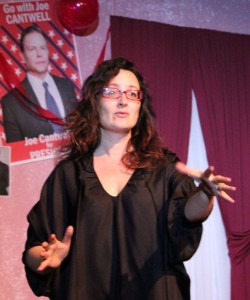 To ensure that local theater buffs have an opportunity to experience the finest that theater has to offer, she essays each season to strike just the right balance between classic plays (think Arthur Miller’s Death of a Salesman, David Mamet’s Glengarry Glen Ross, Bernard Slade’s The Same Time Next Year, or this season’s opener, Gore Vidal’s The Best Man), brand new productions (many of which have recently just closed on and off Broadway), and cutting-edge offerings that carry actors and audiences far beyond the realm of escapism and pure entertainment.
To ensure that local theater buffs have an opportunity to experience the finest that theater has to offer, she essays each season to strike just the right balance between classic plays (think Arthur Miller’s Death of a Salesman, David Mamet’s Glengarry Glen Ross, Bernard Slade’s The Same Time Next Year, or this season’s opener, Gore Vidal’s The Best Man), brand new productions (many of which have recently just closed on and off Broadway), and cutting-edge offerings that carry actors and audiences far beyond the realm of escapism and pure entertainment.
It is within the latter rubric that Trossbach in making the biggest splash.
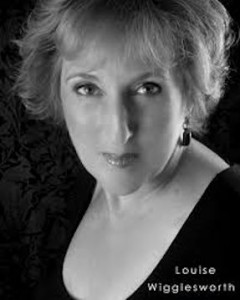 “Annette is changing the perception of what a unique resource theater can be to the community beyond mere entertainment,” cites Louise Wigglesworth, an actor, director, playwright and educator who shares the benefit and perspective or more than 40 years in theater. “Annette Trossbach’s mindset as [Lab Theater] team leader is that our theater take a road not travelled in this locale, producing plays that bravely open conversations on important social issues.”
“Annette is changing the perception of what a unique resource theater can be to the community beyond mere entertainment,” cites Louise Wigglesworth, an actor, director, playwright and educator who shares the benefit and perspective or more than 40 years in theater. “Annette Trossbach’s mindset as [Lab Theater] team leader is that our theater take a road not travelled in this locale, producing plays that bravely open conversations on important social issues.”
This season alone, The Lab has produced plays involving ethics in politics (The Best Man), a mother coming to terms with her son’s sexual orientation, gay marriage and gay adoption 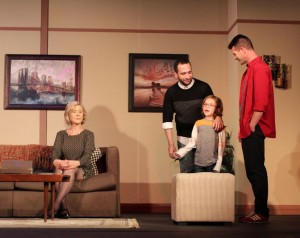 (Mothers and Sons), how we relate to people with life-threatening or terminal illness (I and You), and the interplay between creativity and loss (Burn This). But last season was truly a watershed in terms of tackling subjects rarely brought into the light of day by theater anywhere, much less in Southwest Florida.
(Mothers and Sons), how we relate to people with life-threatening or terminal illness (I and You), and the interplay between creativity and loss (Burn This). But last season was truly a watershed in terms of tackling subjects rarely brought into the light of day by theater anywhere, much less in Southwest Florida.
That started with 2015’s summer stock blockbuster Standing on Ceremony: 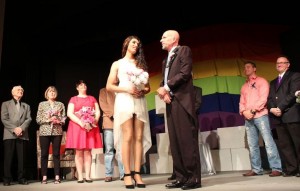 The Gay Marriage Plays and culminated in the 2016 finale of The Rauchenberg Project Plays. The former production dealt with the social, moral and religious impediments to extending the right to marry to members of the LGBTQ community just weeks after the Supreme Court ruled in Obergefell v. Hodges that the
The Gay Marriage Plays and culminated in the 2016 finale of The Rauchenberg Project Plays. The former production dealt with the social, moral and religious impediments to extending the right to marry to members of the LGBTQ community just weeks after the Supreme Court ruled in Obergefell v. Hodges that the 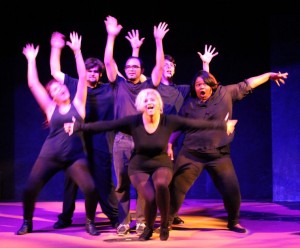 Constitution guarantees a right to same sex-marriage. And through the The Rauschenberg Project Plays, local 12 to 24 year olds worked with Lab Theater professionals to craft plays which elucidated what it’s like to be young and gay, lesbian, bisexual or transgender in Southwest Florida.
Constitution guarantees a right to same sex-marriage. And through the The Rauschenberg Project Plays, local 12 to 24 year olds worked with Lab Theater professionals to craft plays which elucidated what it’s like to be young and gay, lesbian, bisexual or transgender in Southwest Florida.
“Theater was never meant to be just for entertainment,” insists Trossbach. “It’s always been about morality and 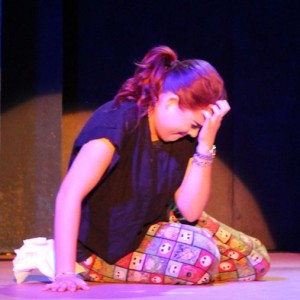 ethics and social mores. It’s about telling an oral history of the culture in which we live with an eye to the future. It should reveal truths and morality while keeping an eye on the powers that be, as it has for hundreds of years.”
ethics and social mores. It’s about telling an oral history of the culture in which we live with an eye to the future. It should reveal truths and morality while keeping an eye on the powers that be, as it has for hundreds of years.”
The trick, of course, is to produce pieces that raise social consciousness without alienating, isolating or excluding whole segments of the audience and community at large.
Trossbach and The Lab are also breaking new ground by staging 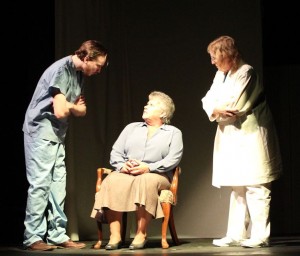 productions that are both experiential and immersive. Last November’s production of Arthur Kopit’s Wings falls squarely within this category. The play follows a retired aerial acrobat by the name of Emily Stilson who suffers a stroke in the play’s opening moments. But it was not enough to show the audience what happens to the protagonist in the stroke’s aftermath. In order to convey first-hand Stilson’s fear and frustration as she struggles to make
productions that are both experiential and immersive. Last November’s production of Arthur Kopit’s Wings falls squarely within this category. The play follows a retired aerial acrobat by the name of Emily Stilson who suffers a stroke in the play’s opening moments. But it was not enough to show the audience what happens to the protagonist in the stroke’s aftermath. In order to convey first-hand Stilson’s fear and frustration as she struggles to make 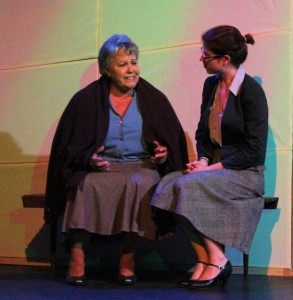 sense of what’s happened to her and fights to regain her memory, grasp of language and the mobility requisite for living independently, The Lab combined the playwright’s stream-of-consciousness script with tech-savvy sound and lighting special effects to combine to take the audience directly into Stilson’s head.
sense of what’s happened to her and fights to regain her memory, grasp of language and the mobility requisite for living independently, The Lab combined the playwright’s stream-of-consciousness script with tech-savvy sound and lighting special effects to combine to take the audience directly into Stilson’s head.
The Lab went even farther to drive home its point. It coupled the immersive experience of the play with an audience talk-back and panel discussion featuring experts that ranged from health care professionals (Dr. Joe Ryan 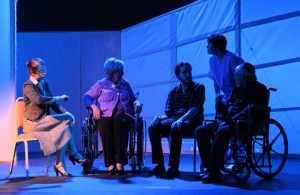 and RN Tammy Booth from Lee Health) to stroke veterans, caregivers and affected family members in an effort to induce the community to share information and discuss their own experiences with strokes, dementia and Alzheimer’s Disease.
and RN Tammy Booth from Lee Health) to stroke veterans, caregivers and affected family members in an effort to induce the community to share information and discuss their own experiences with strokes, dementia and Alzheimer’s Disease.
“Early on, Annette was told no one would attend panel discussions or speakers’ 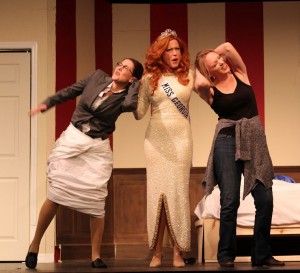 series or come to plays about gay people, racial conflict and the Holocaust,” observes Wigglesworth, who nominated Trossbach for this year’s class of MAKERS.
series or come to plays about gay people, racial conflict and the Holocaust,” observes Wigglesworth, who nominated Trossbach for this year’s class of MAKERS.
Admittedly, Trossbach is not alone in her efforts to bring consciousness-raising, immersive theater to audiences or produce plays that educate and enlighten audiences as much as they entertain. Producing Artistic Director Bill Taylor is also pushing the envelope at 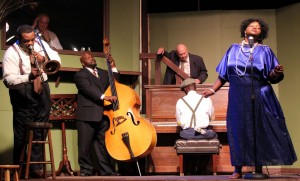 Theatre Conspiracy with last season’s “Year of the Female Playwright” and shows that deal with hot topics ranging from gun ownership and control (The Gun Show) to politics and the Electoral College (The Taming), race relations and prejudice (Ma Rainey’s Black Bottom and The Cave) and health and
Theatre Conspiracy with last season’s “Year of the Female Playwright” and shows that deal with hot topics ranging from gun ownership and control (The Gun Show) to politics and the Electoral College (The Taming), race relations and prejudice (Ma Rainey’s Black Bottom and The Cave) and health and 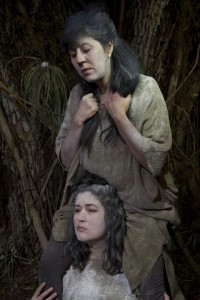 degenerative disease (33 Variations). Ghostbird Theatre co-founders Brittney Brady, Jim Brock, Katelyn Gravel and Philip Heubeck are taking local theater to a whole new level with site-specific theatrical pieces (including Antigonick (performed at Marcus Jansen’s UNIT A contemporary art space), The Chicken Play (performed at the Happehatchee Center in Estero) and this April’s No. 27 (at Shangri-La Springs in Bonita) that engage, inspire and educate audiences by moving them toward a more poetic sense of self and world. And Barry Cavin and Greg Longenhagen at FGCU’s Bower School of Music & The Arts and Stuart Brown at Florida SouthWestern State College regularly produce unorthodox, experimental student-based
degenerative disease (33 Variations). Ghostbird Theatre co-founders Brittney Brady, Jim Brock, Katelyn Gravel and Philip Heubeck are taking local theater to a whole new level with site-specific theatrical pieces (including Antigonick (performed at Marcus Jansen’s UNIT A contemporary art space), The Chicken Play (performed at the Happehatchee Center in Estero) and this April’s No. 27 (at Shangri-La Springs in Bonita) that engage, inspire and educate audiences by moving them toward a more poetic sense of self and world. And Barry Cavin and Greg Longenhagen at FGCU’s Bower School of Music & The Arts and Stuart Brown at Florida SouthWestern State College regularly produce unorthodox, experimental student-based 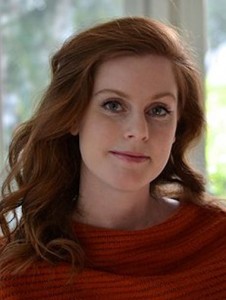 performances.
performances.
But Trossbach is clearly a leading figure in this theatrical vanguard.
“Annette has been working hard for years to provide distinctive and varied theater to the Fort Myers area,” says Brady (pictured right). “She has enriched our community through season programming and we are all grateful for the incredible amount of education and outreach that her company provides.”
Building Community
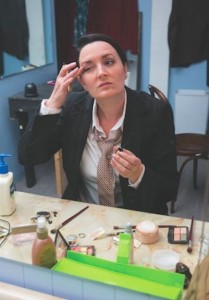 An integral component of Trossbach’s approach to the industry is her belief that theater must serve as a vehicle for giving voice to segments of the community who feel marginalized or completely excluded from the mainstream.
An integral component of Trossbach’s approach to the industry is her belief that theater must serve as a vehicle for giving voice to segments of the community who feel marginalized or completely excluded from the mainstream.
“Her legacy is inclusivity, where every group and their stories can be represented on stage, where artists and technicians of every color, nationality and gender are welcome to study and work, and where audiences have a safe place to be entertained, to discuss, to challenge, and to grow,” adds Wigglesworth.
Different, novel, even opposing points of view can more easily be heard and given c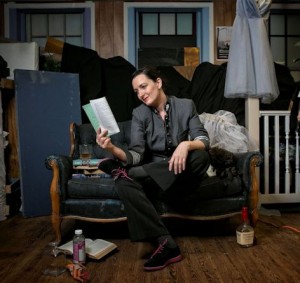 redence because of theater’s communal characteristics. “We are sitting in the dark, being taken on a journey together, reacting together, and that immediacy is addictive,” Trossbach notes. It’s not necessary to refer to the comment thread to find out how everyone else feels about what they’ve just seen and heard. “We all felt it and we can all hang out afterward to talk about what we experienced.”
redence because of theater’s communal characteristics. “We are sitting in the dark, being taken on a journey together, reacting together, and that immediacy is addictive,” Trossbach notes. It’s not necessary to refer to the comment thread to find out how everyone else feels about what they’ve just seen and heard. “We all felt it and we can all hang out afterward to talk about what we experienced.”
In Trossbach’s experience, the language of theater is universal and transcendent. 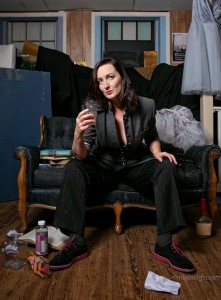 It crosses demographic, socio-economic, racial and cultural strata. “I like to see people learning from theater, discovering universal truths, relating to one another and raising our consciousness,” Annette effuses. “I want to bring people together and to raise people up. Theater is the perfect place to make that happen.”
It crosses demographic, socio-economic, racial and cultural strata. “I like to see people learning from theater, discovering universal truths, relating to one another and raising our consciousness,” Annette effuses. “I want to bring people together and to raise people up. Theater is the perfect place to make that happen.”
“She is a champion for the theater’s ability to connect people, raise social consciousness and, ultimately, make a difference,” says Ghostbird Theatre’s Brittney Brady. “We all do well to be reminded of that power, the power that lies in looking deeper and connecting.”
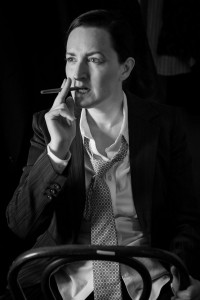 As a result of visionary ideas like these, Trossbach and The Lab have been able to form positive coalitions throughout the community that are likely to result in continued growth in the years to come. Among these are public-private partnerships with the City of Fort Myers, Southwest Florida Community Foundation and the Robert Rauschenberg Foundation.
As a result of visionary ideas like these, Trossbach and The Lab have been able to form positive coalitions throughout the community that are likely to result in continued growth in the years to come. Among these are public-private partnerships with the City of Fort Myers, Southwest Florida Community Foundation and the Robert Rauschenberg Foundation.
“We simply could not have put on a play like Wings without the grants we received from the City of Fort Myers and Southwest Florida Community Foundation that enabled us to upgrade our antiquated sound and lighting systems,” Trossbach notes, her voice conveying a deep sense of gratitude for this critical support.
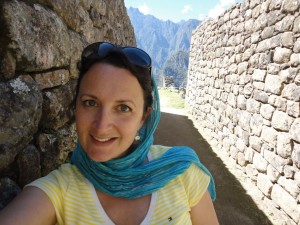 Of course, like many regional and community theater groups, The Lab counts heavily on the support of the community and its network of volunteers. Today, The Lab has more than 8,000 patrons and 200 volunteers. The latter assist in costume design and creation, set building and painting, and ongoing word-of-mouth and social media marketing and promotional efforts. Last year alone,
Of course, like many regional and community theater groups, The Lab counts heavily on the support of the community and its network of volunteers. Today, The Lab has more than 8,000 patrons and 200 volunteers. The latter assist in costume design and creation, set building and painting, and ongoing word-of-mouth and social media marketing and promotional efforts. Last year alone, 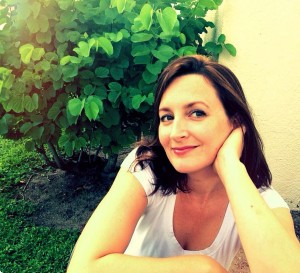 The Lab’s dedicated coterie of volunteers logged more than 19,000 hours.
The Lab’s dedicated coterie of volunteers logged more than 19,000 hours.
“I see The Lab as a joint effort among the Board, myself and our creative team members,” Annette professes. That was her overarching goal in founding the theater in 2008, and one of the chief reasons she organized The Lab as a 501(c)(3) organization.
That’s never been more important now that The Lab is 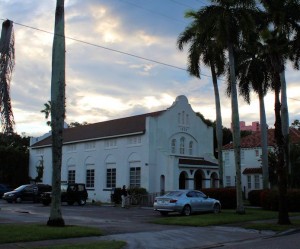 purchasing a permanent home in the Fort Myers River District that has greater capacity for technologically sophisticated plays, panel discussions, speaker’s events and outreach to local schools and non-profit organizations.
purchasing a permanent home in the Fort Myers River District that has greater capacity for technologically sophisticated plays, panel discussions, speaker’s events and outreach to local schools and non-profit organizations.
Education
Education is also a crucial aspect of all Lab Theater 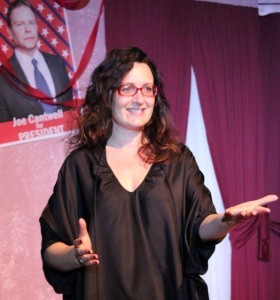 productions and functions. The Lab conducts classes and workshops for playwrights, actors, stage hands and technicians of all ages. Three times a year, The Lab presents directed staged readings that offer local and nationally-acclaimed playwrights live audience-based focus groups where they can test new ideas and approaches and give actors the ability to hone their skills and refine their on-stage presence. And The Lab offers internships that provide career training in all aspects of theater making and marketing.
productions and functions. The Lab conducts classes and workshops for playwrights, actors, stage hands and technicians of all ages. Three times a year, The Lab presents directed staged readings that offer local and nationally-acclaimed playwrights live audience-based focus groups where they can test new ideas and approaches and give actors the ability to hone their skills and refine their on-stage presence. And The Lab offers internships that provide career training in all aspects of theater making and marketing.
“Theater’s a difficult industry to break into,” Trossbach admits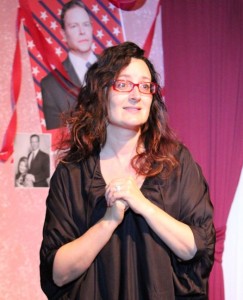 “So making sure we are giving opportunities to new artists – playwrights, actors, directors and designers – is very important.”
“So making sure we are giving opportunities to new artists – playwrights, actors, directors and designers – is very important.”
“Annette takes risks on new work and new artists because she appreciates the legacy of the theater,” agrees Ghostbird’s Brittney Brady.
But it’s not just the chance to be part of a production or appear on stage. It’s the opportunity to receive hands-on training. “Almost everyone who directs a production for The Lab comes from either a professional theater or educational background,” reports Wigglesworth.
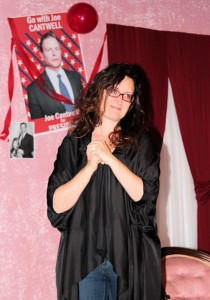 “It is important that actors learn and grow through our productions,” amplifies Trossbach, who trained at the innovative East 15 Drama School in London and worked with Margaret Walker (What a Lovely War), international combat choreographer Mike Loades, director Terry Johnson, Alasdair Ramsey and actor Tony Scannell. “They are increasing their skills for us, and as they go to other theaters in Southwest Florida, they take their new skills with them. We take our part in training, curating and promoting that talent very, very seriously.”
“It is important that actors learn and grow through our productions,” amplifies Trossbach, who trained at the innovative East 15 Drama School in London and worked with Margaret Walker (What a Lovely War), international combat choreographer Mike Loades, director Terry Johnson, Alasdair Ramsey and actor Tony Scannell. “They are increasing their skills for us, and as they go to other theaters in Southwest Florida, they take their new skills with them. We take our part in training, curating and promoting that talent very, very seriously.”
Actor Scott Carpenter, who is appearing in the Lab’s production of Rick Abbot’s Play On! through April 1, could not agree more. “I have had the great 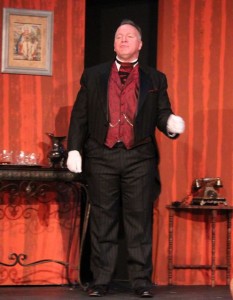 pleasure to both share the stage with [Annette] and have her direct me in several plays at Laboratory Theater. She has the ability to bring things out of me as an actor like no other director in my acting career. I trust her implicitly.”
pleasure to both share the stage with [Annette] and have her direct me in several plays at Laboratory Theater. She has the ability to bring things out of me as an actor like no other director in my acting career. I trust her implicitly.”
While the instruction Trossbach imparts to playwrights, directors, designers, techs and actors improves the theater we all see today, by passing on the lessons they’ve learned to colleagues and up-and-comers, Trossbach is influencing the depth and quality of the theater we will all enjoy for years and years to come.
Community Outreach
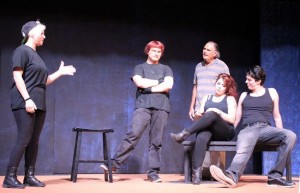 One area in which Laboratory Theater stands apart is its commitment to community outreach. Nowhere was that more in evidence than during the Rauschenberg Project Plays. It was only by dint of Trossbach’s authenticity and integrity that she was able to overcome the natural suspicions and wariness of 12 t0 24 year old members of the
One area in which Laboratory Theater stands apart is its commitment to community outreach. Nowhere was that more in evidence than during the Rauschenberg Project Plays. It was only by dint of Trossbach’s authenticity and integrity that she was able to overcome the natural suspicions and wariness of 12 t0 24 year old members of the 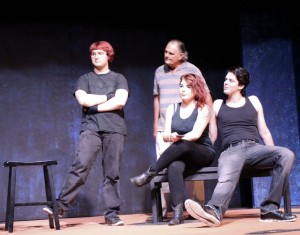 LGBTQ community and induce 186 of them to not only tell their stories, but create plays that illustrate the challenges they face each day growing up gay, bisexual or transgender.
LGBTQ community and induce 186 of them to not only tell their stories, but create plays that illustrate the challenges they face each day growing up gay, bisexual or transgender.
“Funded by the Robert Rauschenberg Foundation, young people shared their stories of life in a world that sees them as different,” recounts Wigglesworth. “Staff professionals helped these students craft their stories into scenes for the 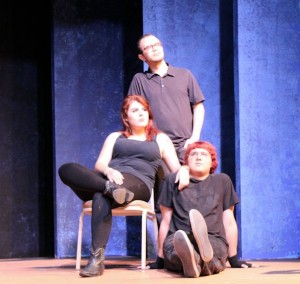 stage, then taught them the skills required to act, to design, to light, costume and mount the work.”
stage, then taught them the skills required to act, to design, to light, costume and mount the work.”
Although those plays were staged last Spring, the work is ongoing and has led to further grants for theater projects based on the prevention of gay suicide and human trafficking. “No other theater in our area does that kind of work,” notes Wigglesworth.
In fact, no other local theater owner or operator is doing more to defy social norms, question 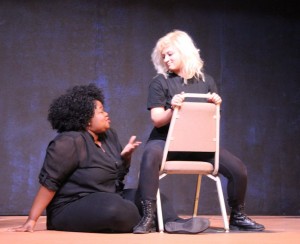 prevailing attitudes about gender identity and orientation, or break through associated barriers and limitations.
prevailing attitudes about gender identity and orientation, or break through associated barriers and limitations.
A Nod to the Bard
Perhaps lesser known, but no less important, is Trossbach dogged determination to reinvigorate Shakespeare among local actors and audiences.
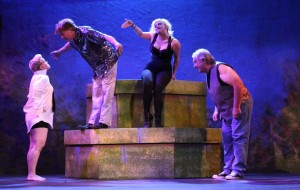 “Ten years ago, Annette approached a theater in Cape Coral which was looking for program ideas,” relates Wigglesworth. “She suggested a weekend of Shakespeare’s best known scenes and was told no one around here is interested in Shakespeare. No actors would audition and no audiences would come.”
“Ten years ago, Annette approached a theater in Cape Coral which was looking for program ideas,” relates Wigglesworth. “She suggested a weekend of Shakespeare’s best known scenes and was told no one around here is interested in Shakespeare. No actors would audition and no audiences would come.”
Forty actors answered her casting call. The weekend sold out. And Trossbach has gone on to not only include Shakespeare in The Lab’s annual programming, but to organize three Shakespeare festivals in Florida with theater and high school groups from all over Florida participating in the events.
“In eight seasons, The Lab’s Shakespearean productions 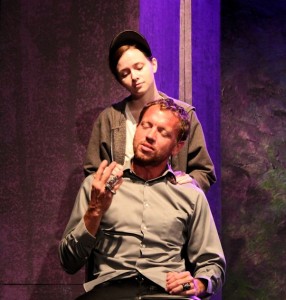 are the highest grossers,” Wigglesworth adds with an air of satisfaction.
are the highest grossers,” Wigglesworth adds with an air of satisfaction.
The 2017 MAKERS will be honored March 23, 2017 at the premiere of WGCU’s TV documentary 2017 MAKERS: Women Who Make Southwest Florida. Portraits of 2017 MAKERS will air on WGCU HDTV and WGCU FM and will be archived at wgcumakers.org.
WGCU is Southwest Florida’s source for PBS and 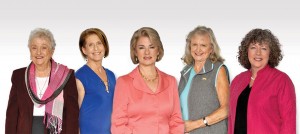 NPR programming. As a member-supported service of Florida Gulf Coast University, WGCU’s mission is to provide educational programming that inspires, informs and engages our community. Serving seven counties, one-fifth of the state of Florida,
NPR programming. As a member-supported service of Florida Gulf Coast University, WGCU’s mission is to provide educational programming that inspires, informs and engages our community. Serving seven counties, one-fifth of the state of Florida, 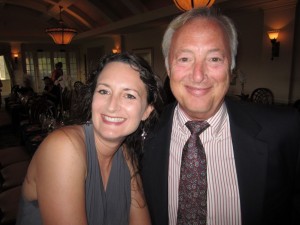 three distinct digital TV channels, two FM radio channels and three HD radio channels, a monthly magazine and a robust website, WGCU delivers national and international programming and develops, produces and delivers relevant, informative and educational local programs to the Southwest Florida community. More information about WGCU is available online at WGCU | Your Southwest Florida Source for Public Broadcasting.
three distinct digital TV channels, two FM radio channels and three HD radio channels, a monthly magazine and a robust website, WGCU delivers national and international programming and develops, produces and delivers relevant, informative and educational local programs to the Southwest Florida community. More information about WGCU is available online at WGCU | Your Southwest Florida Source for Public Broadcasting.













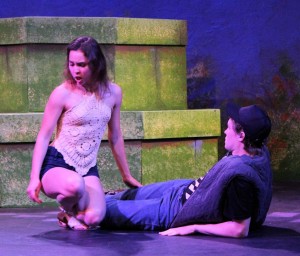

 Tom Hall is both an amateur artist and aspiring novelist who writes art quest thrillers. He is in the final stages of completing his debut novel titled "Art Detective," a story that fictionalizes the discovery of the fabled billion-dollar Impressionist collection of Parisian art dealer Josse Bernheim-Jeune, thought by many to have perished during World War II when the collection's hiding place, Castle de Rastignac in southern France, was destroyed by the Wehrmacht in reprisal for attacks made by members of the Resistance operating in the area. A former tax attorney, Tom holds a bachelor's degree as well as both a juris doctorate and masters of laws in taxation from the University of Florida. Tom lives in Estero, Florida with his fiancee, Connie, and their four cats.
Tom Hall is both an amateur artist and aspiring novelist who writes art quest thrillers. He is in the final stages of completing his debut novel titled "Art Detective," a story that fictionalizes the discovery of the fabled billion-dollar Impressionist collection of Parisian art dealer Josse Bernheim-Jeune, thought by many to have perished during World War II when the collection's hiding place, Castle de Rastignac in southern France, was destroyed by the Wehrmacht in reprisal for attacks made by members of the Resistance operating in the area. A former tax attorney, Tom holds a bachelor's degree as well as both a juris doctorate and masters of laws in taxation from the University of Florida. Tom lives in Estero, Florida with his fiancee, Connie, and their four cats.